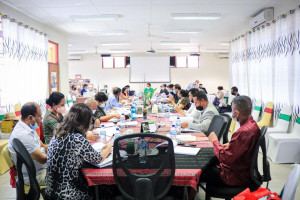Government and National Parliament conclude discussion in the specialty of the Law Proposal on the General State Budget and Public Finance Management Framework

The Ministry of Finance team, led by Her Excellency the Vice Minister of Finance, Dra. Sara Lobo Brites, along with the members of committee C and D of the National Parliament, dealing with matters Public Finances and Economics and Development, respectively, concluded the discussion session in the specialty of the Draft Law on the Budgetary Framework (LEO) and Public Finance Management, on Friday, August 13th 2021, with the approval of 125 articles.
The LEO proposals marks an important step in the continuation of the implementation of the Public Finance Management Reform program that the VIII Constitutional Government prioritizes and intends to complete during its mandate.
The LEO proposals will replace the current Budget and Financial Management Law (LOGF) which has been in force for more than a decade. These changes are important and urgent to respond to the limitations of the current LOGF. For this reason, and given the volume and substantial changes, in essential aspect, of the budgetary framework and public finance management, it is recommended the approval of a new Diploma, repealing Law no. 13/2009 (LOGF), of October 21st.
Another fundamental reason is that legislation should essentially be a facilitator of financial management and not and obstacle to the development of the State function. For this reason, it is urgent to overcome the limitations that prevent the State from executing the entire budget.
This change in the legal framework of the General State Budget and Public Finance Management is also an opportunity to incorporate the best international practices on budgeting and transparency, when appropriate to the Timor-Leste’s reality.
The changes also serve for a clear definition of what the Public Sector is and what the General State Budget Roadmap should be, budgeting by programmes, the multiannual budget programming and the alteration of the budget calender, which are now different.
The definition of the public sector adopts the organizational structure of the public sector, and is based on the International Monetary Fund Manual with respect to the Government Statistics Manual, on a national account that is used internationally by other countries.
During the preparation, elaboration and discussion process, of the LEO proposal, the Government and the PN carried out several consultations with the economic and social sectors, such as the Central Bank of Timor-Leste, the RAEOA, the Social Security, the Audit Chamber, the Petroleum Fund Investment Advisory Board, FONGTIL, La’o Hamutuk and the International Monetary Fund. The LEO proposal included several recommendation and suggestions that were presented to the International Monetary Fund technical team, and also reflect the recommendation cited in the Public Expenditure and Financial Accountability 2018 Report.
According to the National Parliament last agenda, the plenary session for the discussion and final global vote on the LEO proposal will take place at the end of September, when the NP resumes activities after the recess.
The proposal for the Budget Framework and Public Finance Management Law was generally approved on July 6th 2021, followed by the discussion and approval of the specialty, on August 13th 2021.
The plenary session for approval of the LEO Proposal was chaired by the President of the NP, His Excellency Aniceto Longuinhos Guterres Lopes, accompanied by the members of the NP board. The Draft Law was presented and defended by the Minister of Finance, Rui Augusto Gomes and the Vise-Minister of Finance, Sara Lobo Brites, accompanied by the Ministry of Finance technical team, as proponents of the aforementioned Draft Law.










































